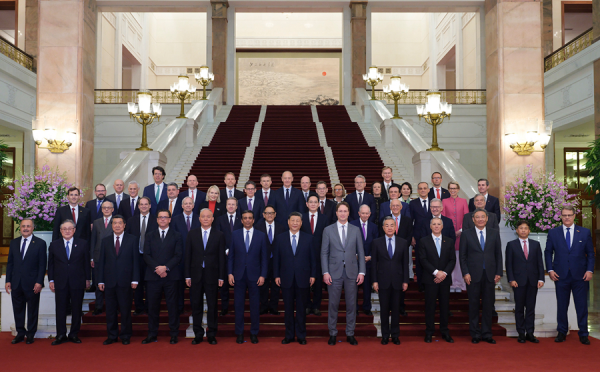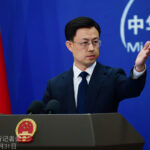
Chinese President Xi Jinping with representatives of the international business community in Beijing on March 28, 2025.
China Faces Global Trade Pressures While Strengthening Foreign Investment Drive
Beijing: China is navigating a complex landscape of escalating global trade tensions and a concerted effort to attract foreign investment to bolster its economy. In 2024, the World Trade Organization (WTO) recorded significant cases against China, with research indicating that nearly half of all disputes involved Chinese trade practices.
According to recent research by an economics professor at Peking University, nearly half of all the cases brought before the WTO last year were directed against China, marking an all-time high. While developed economies like Europe and Japan continue to scrutinize China’s trade policies, an unprecedented surge in complaints has come from developing countries, including India, Türkiye, Pakistan, and Brazil. This signals widespread concern over China’s export dominance and its impact on global market dynamics.
Economic analysts have noted that the global trade environment has become more hostile, with growing protectionist measures, rising tariffs, and disputes over intellectual property rights being central to many of these cases. Experts argue that this broadening of the dispute landscape is partly due to China’s rapid economic rise, which has resulted in concerns from countries whose industries are feeling pressure from China’s cheaper goods and aggressive market strategies. These tensions are compounded by shifts in global supply chains, with many countries looking to decouple their economies from China in the aftermath of the pandemic.

Guo Jiakun, a spokesperson for China’s Foreign Ministry, reiterated today in Beijing the nation’s commitment to WTO rules and an open global economy. He emphasized that trade disputes should be resolved through established WTO mechanisms, cautioning against unilateral actions that could disrupt international trade norms. This position underscores Beijing’s resistance to external economic pressures, including the latest tariff threats from the United States. Former U.S. President Donald Trump recently suggested the possibility of imposing secondary sanctions on countries purchasing Russian oil—an action that could further strain US – China relations, given China’s significant energy ties with Russia. Guo also noted that such economic measures would only exacerbate tensions and undermine global stability.
Amid these challenges, China has intensified efforts to attract foreign investment, viewing it as crucial for sustaining economic growth. President Xi Jinping, on March 28, 2025, met with executives from multinational corporations. Over 40 global chairpersons and chief executive officers from international companies, along with representatives from various business councils, participated in the meeting. Notable speakers included Rajesh Subramaniam, President of FedEx Corporation; Ola Källenius, Chairman of the Board of Management at Mercedes-Benz AG; Paul Hudson, Chief Executive Officer of Sanofi SA; Georges Elhedery, Executive Director of HSBC Holdings Plc; Toshiaki Higashihara, President of Hitachi Ltd.; Kwak Noh-jung, President of SK Hynix Inc.; and Amin Nasser, President of Saudi Aramco.
“They applauded the Chinese government’s efforts to create a fair and enabling environment for foreign businesses and expressed readiness to expand investment cooperation with China, cultivate the China market, actively participate in Chinese modernization, and build bridges for China’s exchanges and cooperation with the world. They also expressed readiness to support an open global market, uphold international free trade, and contribute to the development of the world economy,” the Chinese Foreign Ministry stated.
These engagements underscore China’s commitment to economic openness and its appeal as a destination for global business. Xi reassured foreign investors that China remains a land of opportunity, with a stable policy environment and a vast consumer market.
Carlos Ghosn, former Chief Executive Officer of Nissan and Renault, has expressed optimism about China’s market potential. He stated, “We continue to be bullish on China.” This optimism is reflected in the growing number of foreign companies that have expanded their operations in China, even amidst the global trade volatility. The Chinese government’s focus on high-tech and sustainable industries, as well as green energy initiatives, has made China an attractive market for foreign investors interested in future growth sectors.
Additionally, Joe Hackett, Secretary General of Ireland’s Department of Foreign Affairs, highlighted the positive trajectory of China-Ireland relations during a meeting with Ambassador Zhao Xiyuan. Hackett remarked on the “positive momentum in Ireland-China relations” and expressed a willingness to collaborate further to enhance bilateral ties. This is indicative of the broader trend, where countries that have long-standing trade relationships with China are looking to deepen their engagement, seeking to take advantage of the significant economic opportunities available in the Chinese market.
In February 2025, the Chinese government unveiled a comprehensive action plan to stabilize foreign investment, introducing 20 targeted initiatives. These measures aim to ease market access in sectors like telecommunications, healthcare, and education, encourage equity investment in domestic enterprises, and lift financing restrictions for foreign-invested firms. Priority areas for foreign capital include high-tech industries, elderly care, culture and tourism, sports, and financial services. The Chinese government’s focus on these sectors is seen as a strategic move to position the country as a leader in innovation, environmental sustainability, and healthcare, areas that are expected to drive the global economy forward.
These proactive steps are viewed as efforts to counteract sluggish domestic consumption and a struggling property market, which have weighed on China’s growth prospects. The government’s engagement with global businesses at forums such as the China Development Forum and the Boao Forum for Asia further signals its intent to present a welcoming environment for foreign investors. In fact, China’s recently signed free trade agreements with key economies, including RCEP (Regional Comprehensive Economic Partnership) and its ongoing negotiations with the European Union, are expected to play a pivotal role in reinforcing the country’s trade relationships and enhancing its economic resilience.
However, geopolitical challenges persist. Recently, U.S. Defense Secretary Pete Hegseth referred to Japan as “indispensable for tackling Chinese aggression,” intensifying regional tensions. In response, Guo Jiakun addressed these remarks, stating that military and security cooperation between the U.S. and Japan should not target any third country or destabilize regional peace. He cautioned that labeling China as a “threat” risks fostering ideological division and undermining regional stability. Guo also reaffirmed China’s position on Taiwan, reiterating that the issue remains an internal matter for China and rejecting any external interference.
On another front, reports recently surfaced about China’s State Administration for Market Regulation (SAMR) reviewing the planned sale of CK Hutchison’s port assets to BlackRock. Guo Jiakun responded to the reports, stating that SAMR would review the deal in accordance with the law, with a focus on maintaining fair market competition and safeguarding public interests. Guo further emphasized that China firmly opposes using economic coercion to harm the legitimate rights and interests of other countries, highlighting China’s commitment to transparent regulatory processes while ensuring fair competition.
As China navigates these complex trade, investment, and security dynamics, the world watches closely. While Beijing strives to reinforce its role as a global economic hub, escalating trade disputes and geopolitical tensions continue to pose significant challenges. Whether China’s diplomatic and economic initiatives will suffice to maintain its position as a key player in global trade and investment remains to be seen.
– global bihari bureau





